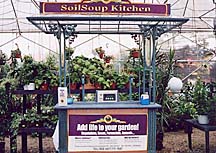|
Soil soupby AMY STEWART YOU'RE PROBABLY GETTING TIRED of hearing me talk about dirt, especially now that the weather's warming up and something is actually happening aboveground. But this little news item came across my desk and it's just too good to ignore. Mad River Nursery has gotten
itself into the café business. Now, before you head out
there for coffee and a scone, you should be forewarned that their
"coffee cart" (like the one pictured here) dispenses
a lukewarm, dark brown, bacteria-laden product that will not
be improved by the addition of steamed milk and nutmeg sprinkles.
It's not a drink for you -- it's for your garden. At only 5 bucks
a gallon, it's considerably cheaper than a latte and it's a real
crowd-pleaser: Millions of bacteria, fungi, protozoa, nematodes
and plant roots in your garden will thank you. The SoilSoup cart was supplied by a company in Washington state that specializes in compost tea, a rich elixir brewed from compost and worm castings. Constant aeration keeps the bacteria alive, and when I checked the ingredients in their Nutrient Solution (the starter from which the tea is made), I saw that they'd added molasses, a food source that, according to some folks, keeps the healthy bacteria reproducing like mad. They claim that up to a billion microbes can be found in just one teaspoon of SoilSoup. Now, if somebody told me that a hundred microbes lived in a teaspoon of some brown soupy mixture I was going to carry home to my garden in the back seat of my car, I might get a little worried. But a billion microbes per teaspoon? That's enough to keep me up at night. Mad River's Peter Koczko told me that SoilSoup acts as a biocatalyst. "It breaks down organic matter," he said. "It'll help organic fertilizer work better." I asked him about the product's nitrogen, phosphorus and potassium (NPK) rating. "You can't rate it on an NPK scale," he told me. "It's really about the microbes that live in this stuff, and not so much about any individual nutrient it contains." This seems to be the direction that organic gardening is headed. Soil is, after all, made up of clay and sand particles, water, air and millions of microbes that improve the soil and nourish plants. When you start to think about the soil as an intact community, an ecosystem, it makes sense that the fertilizers you use should enhance that community of invisible creatures. Dr. Scott Subler, former Ohio State University ecologist and owner of a worm composting company, once told me that we used to think of plants sucking up nutrients like nitrogen the way you'd drink through a straw. Now, he said, we've finally figured out that plant growth is more complicated than that. Plant roots form intricate relationships with the unseen inhabitants of the soil. It makes sense that the right mixes of bacteria and other microbes could support plant growth, and help plants fight off diseases, in a way that ordinary chemical fertilizers could not. Besides, there's just something so satisfying about bringing a gallon jug down to the nursery and getting it filled up with hooch for the garden. It's worth $5 just to have the experience. If you do decide to give the stuff a try, you should keep in mind that you are bringing home billions of living creatures. They will not survive long in your plastic jug. You've got 12 to 18 hours to use the stuff, so plan accordingly. You can use SoilSoup as a foliar spray, applying it directly to the leaves of plants, or you can water it into the soil. Either way, it needs to be diluted -- the instructions that come with it recommend dilution ratios of 5:1 for most applications. And for you gearheads out there -- I heard from several of you after I wrote about chipper/shredders and compost tumblers a couple weeks ago, so I know who you are--yes, you can buy your own home-brewing setup and make your own compost tea. It's not cheap, but then again, none of the best gear is. A 10-gallon home brewer sells for $339; the 25-gallon model is $510. While you could use your own compost, you can also purchase a bacterial nutrient solution that will give you exactly the same product that Mad River dispenses from their charming coffee cart. To learn more about compost tea, check out www.soilsoup.com. There is some controversy over whether or not compost tea should be primarily bacteria-based (like Soil Soup) or fungal-based. Dr. Elaine Ingham is of the fungus persuasion; she has posted a great deal of information on the subject at her website, www.soilfoodweb.com.
garden-related announcements and news to Amy Stewart. IN THE NEWS | COVER STORY | PUBLISHER | CALENDAR © Copyright 2003, North Coast Journal, Inc. |


